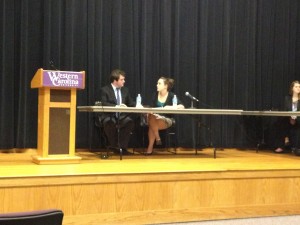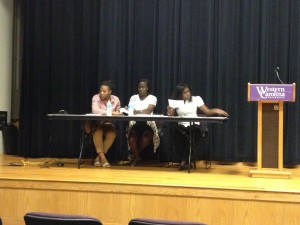There has been a lot of controversy regarding whether college institutions should be allowed to regulate college admission by factoring race, and using race to fill in necessary slots in the school’s freshman class.
The affirmative action has been challenged in several instances and institution in the past year. The Supreme Court in March decided to hear a case from University of Michigan under the same challenge as the Fisher v. University of Texas case. The cases are arguing different legal issues but essentially both are connected to using race as a factor in college admission.
Western Carolina University had not faced a challenge of its enrolment policy like in Michigan and Texas, but it is an issue on the minds of the students and the leaders. Chancellor Belcher said that they would like to implement a new admission process in the near future.
On WCU affirmative action is not clearly stated in the admission process. The admissions office uses the following criteria for accepting undergraduate students: whether the student meets the minimum North Carolina requirements, honors classes taken, advanced placement classes taken, IB courses, coursework that shows strong academics, weighted and unweighted grade point average, class rank, grade trends, and to see if they have taken interest by coming to an open house or campus tour. According to the University of North Carolina Academic Affairs requires that college applicants have four units of English, three units of mathematics, three units of science, three units of social studies at least two units of a foreign language other than English, one unit of health and physical education, and two to six electives or other requirements. Nowhere is race used as a factor for accepting undergraduate students.
“Recent studies show that strictly using SAT/ACT scores for college admissions doesn’t and shouldn’t determine whether a student could be successful in higher learning institutions; rather than SAT/ACT scores, the clearest indication of seeing whether a student is capable is determining their high school GPA and their character,” said Belcher.
According to the 2012 WCU enrollment for undergraduate and graduate, there are: African American 6.4%, Hispanic 1.2%, International 2.9%, Multiple Race/Ethnicity 4.5% American Indian or Alaskan Native 1%, and Asian or Pacific Islander 1% making a total of 17.7%. WCU has also more females (53%) then male (47%) student population. Chancellor Belcher said that these numbers don’t represent a well-diversified campus, even though the numbers have increased over the years.’
Debating affirmative action
The biggest part of affirmative action, is clarifying the issues at hand like racism and discrimination. This subject isn’t just a White versus Black issue; it deals with every race and ethnicity possible. According to the Stanford Encyclopedia of Philosophy affirmative action is defined by, “positive steps taken to increase the representation of women and minorities in areas of employment, education, and business from which they have been historically excluded. When those steps involve preferential selection – selection on the basis of race, gender, or ethnicity- affirmative action generates intense controversy.” WCU Organization of Ebony Students (OES) in April hosted their first Lincoln-Douglas debate on the topic of affirmative action and is it still needed in college admissions?” Students Chelsea White and Garrett Whipkey argued that affirmative action should still be used to regulate college admissions while Mary Breaker, Brielle Ford, and Danielle Hawkins argued the opposing view. Interestingly, all the students arguing against affirmative action were African-Americans.
The positive view argued that affirmative action is necessary to protect equality, and they also argued that rules are put in place for a reason because they balance out the system. These debaters argued that “affirmative action gives minorities the opportunity to improve their learning theory.”
“I feel that affirmative action helps minorities and women because we live in a society where women can’t even be paid equally as men and we are living in a very discriminatory society where the politicians are expressed their disdain for people who are different from them because of religious differences or ethnicity differences. I feel that affirmative action stills plays a huge role in our society as far as dispelling all of the discriminatory prejudices that we’ve held on for hundreds of years,” said White.
Garrett Whipkey, a political science major student took a historical approach to his argument.
“President Johnson eloquently stated that affirmative action ‘is the next and more profound stage of the battle for civil rights. We seek not just equality as a right and a theory, but equality as a fact and as a result.’ This ladies and gentlemen, is the task of affirmative action; to ensure equality on the ground level; to transform the abstract theory of civil rights into a tangible reality,” said Whipkey. The negative side argued that affirmative action is used in the same sense as segregation, because it allows certain individuals to be treated equally and for the remainder not so much. Although the debaters in this team were all African American, two had opposing views from their fellow colleague. These debaters argued that “the minorities who are given the opportunity to study at a higher learning institution aren’t always given that opportunity because they earned it, but rather because they fill a quota because of their ethnicity or the color of their skin. Although that isn’t the case for every instance, this may hinder those who can’t complete the coursework on a college level.”
“Affirmative shouldn’t be used at all or in higher learning institutions because it doesn’t give people a fair chance. For example, say I got into WCU based off of the color of my skin, not because I had a 4.0 GPA in high school, or scored a 2100 on the SAT but just because of the color of my skin. It’s not fair that because it’s not telling me that I will succeed in college or in life, instead it tells me just because I am Black I fit a certain criteria,” said Mary Breaker.
For Brielle Ford the affirmative action “shouldn’t be used at all because it doesn’t make sense to put somebody who doesn’t deserve academically to be in a high standard academic school if they can’t perform the duties that they are going to be given.”
At the end the judges of the debate decided that the arguments from Miller and Whipkey were more compelling and won the debate. During the debate it was clear that Western doesn’t have an affirmative action policy in their admissions process.
Plans for diversifying WCU
The goal of increasing diversity isn’t solely based on increasing the number of Hispanic and African American students, but instead including ethnicities that are more underrepresented. The Chancellor stated that we would like to see more of WCU students study abroad, in addition to more foreign students study at WCU because that alone adds diversity.
According to the 2012 WCU Factbook, WCU is home away from home to students from Jamaica, Saudi Arabia, Colombia, Japan, China, and the United Kingdom. Vice Chancellor for student affairs, Sam Miller said that he is looking to expand our international enrollment to China and India.
“I believe that a diverse learning community is the richest learning environment we can offer our students. We learn far more when we encounter differences from when we encounter sameness. If you confronted with a thought or proposition that doesn’t challenge your own assumptions, you’re not going to grow. We want to create an environment where diversity is valued and not just tolerated for what it can bring into our lives. It’s in the area of ethnicity where we have a long way to go,” said Chancellor Belcher.
Chancellor Belcher added that the lack of diversity among WCU’s faculty and staff correlates to why the student population struggles as well. “One of the strategies that could be used to increase staff and faculty diversity is sending job postings to historically black colleges or universities, predominately white institutions, Hispanic serving institutions, or Native American serving institutions.”
“I think it does represent a good diversity, but I would like to see more (of it) in student and staff population,” said Sam Miller, vice chancellor for student affairs.
As Miller explained a lot depends upon what a student’s idea of a university experience is. “In the WCU community creed and orientation we even talk about the community creed and admissions at open house events. We want our students to get engaged in the arts, culture, and intellectual life of the university; and to me I think that means embracing diversity however you want to define it, whether that’s based on political ideology, personal identity, or even your philosophy in personal ethics. We can layout all of these programs, services, and we do; whether it’s the RESPECT campaign, Red Zone, the programs offered by Intercultural Affairs, Residence Hall programs, we offer all of these opportunities but it’s really up to the student to take on the personal responsibility to go get engaged and to go to events if they have never been to that type of event. Why cheat yourself on that college experience? You may not like or agree with the ideas, and that’s fine, but to push your own personal boundaries is the one of the best ways to prepare yourself for a lifelong career for this ever changing and dynamic world we live in,” said Sam Miller.
The end result is that WCU staff and faculty are aware that campus isn’t as diverse as they would like to, but are saying that their plans to make it more diverse are implemented and that the WCU students are getting the most diverse experience has to offer.
“We stand for excellence, equality, value, and fair treatment,” said Chancellor Belcher in an interview with the Western Carolina Journalist.
Students who find themselves in racial or gender discrimination, can file an unlawful harassment claim. These steps can be found in the student code of conduct where the person must go through certain criteria depending on the circumstance. For situations like these the Office of Student Affairs can help.






